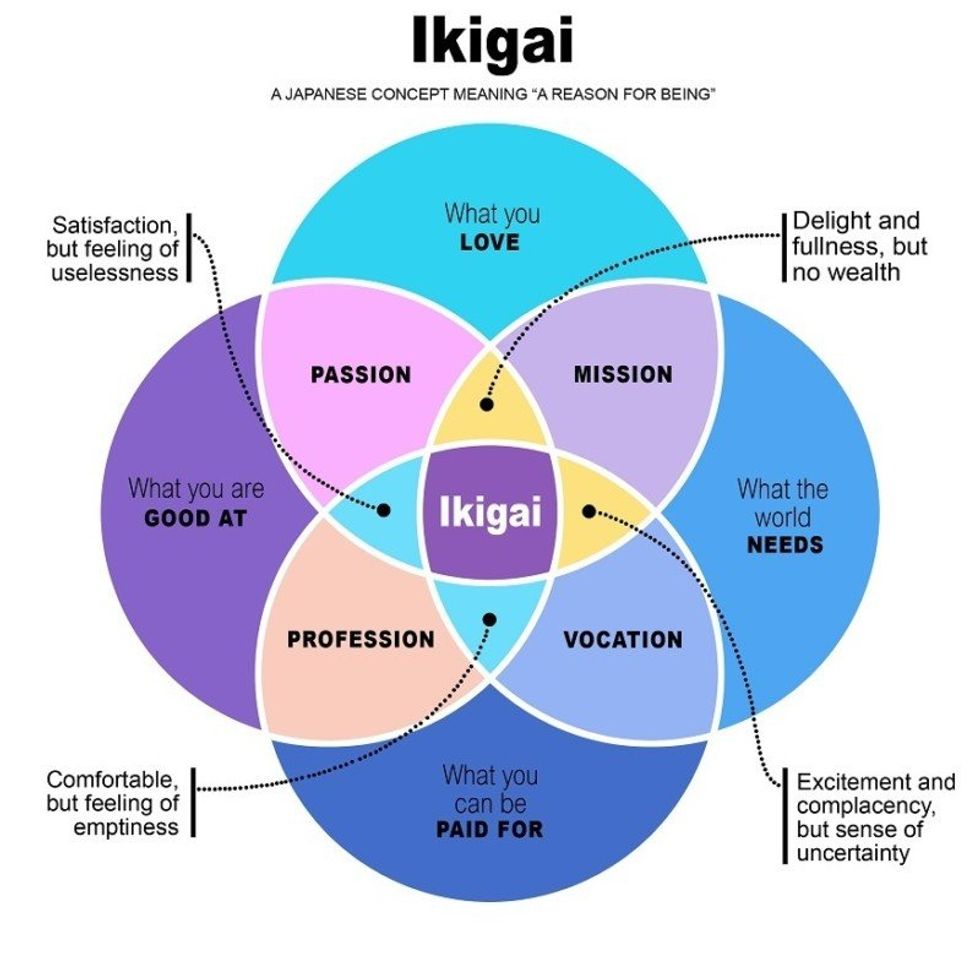Ikigai is a Japanese concept and is comprised of two Japanese characters—iki (meaning life) and gai (meaning value or worth) which together signify values that make life worth living or your “reason to get up in the morning.” It encompasses a sense of purpose and fulfillment in daily life including the pursuit of personal passions, hobbies, family/personal/social relationships, and community. So not only does ikigai represent finding joy, but it recognizes how individuals are interconnected, and their impact in a broader social sense.
You may have more than one ikigai with different things fulfilling different parts of your life. Also, depending on your experiences or stage of life, your ikigai can change or evolve over time. For example, if you have a baby, that child may become your ikigai (or a grandparent’s ikigai).
The concept of ikigai originated in Japan. A high concentration of centenarians (100+-year-olds) live in Okinawa, and they believe that finding ikigai improves your overall well-being and longevity and provides a sense of purpose (with a healthy diet, regular exercise, social connections, and a positive attitude). These individuals have figured out that finding their ikigai gives them a reason to get up in the morning, giving them fulfillment each day to live such long active lives. Ikigai doesn’t have to be complicated and may be as simple as gardening, dancing/singing, or even sipping a favorite tea. My mom’s friend, Tsuchino (who is over 90 years old), told me that her ikigai is playing sudoku.
My ikigai is cooking, which was inspired by my mom. Not only did she cook every day for our family, but she loved to cook for friends and neighbors. I remember them sitting around the kitchen table, talking/laughing, and savoring her homemade gyozas. My mom was sharing a part of herself, and I cherish her gyoza recipe. Despite how hectic my life can be sometimes, it energizes me to cook for others (curiously trying new recipes). I even bake and mail cookies to unsuspecting family/friends. Someone may not be having a “great” day and that box of cookies shows them that I was thinking of them. Sharing my love for cooking gives me immense joy and is my ikigai!
The Western Interpretation Of Ikigai

Graphic created by Debra Shannon
The Western interpretation of ikigai captures some of the original Japanese concept, but it focuses on career-centric aspects and is typically depicted by the above Venn diagram. Even within the Japanese concept, your ikigai could be work. The philosophy is to align personal passions with professional pursuits to find meaningful work by determining:
- What you love,
- What you are good at,
- What you can be paid for, and
- What the world needs.
The intersection and convergence of these four elements is your ikigai (although ikigai is not necessarily something you need to be paid for within the Japanese concept). Again, depending on the stage of your career, your ikigai can change or evolve over time. For example, maybe you’re considering pivoting and starting your own company or buying a franchise. Also, you can have more than one ikigai. Besides your regular job, maybe you get fulfilled from volunteering or helping the community.
There is a quote by Confucius, “Choose a job you love, and you will never have to work a day in your life.” So don’t wait until you’ve retired to find your ikigai. Finding your passion and mission can increase your work satisfaction and overall career fulfillment.
For me, I gravitate towards roles where I transform chaos into calm and figured out that this is my “work” ikigai. I understand why I’m passionate about helping companies that have been enduring too much distress and solving those complex problems with practical solutions. I also love sharing my knowledge through mentoring, volunteering (such as STEM organizations), and even creating LinkedIn content.
Understanding Your Ikigai
Ikigai is understanding your whole self over your lifetime, and the key is to appreciate the present moment and do the things you value and give your life meaning. Even after you “retire from work,” what will bring you joy and give you a reason to get up in the morning?
What is your ikigai? If you don’t know, you can start by self-reflecting. When are you the happiest (putting a smile on your face just thinking about it)? Or what activities do you look forward to doing in the future? Realizing what’s important to you and what you enjoy actively doing will bring you closer to finding your ikigai. To me, life is too short not to enjoy it . . . and find the simple things that will bring you joy each day!
For more information about ikigai and finding values that make life worth living, follow me on LinkedIn!




